Tara Y. and husband had their first hearing loss experience when their oldest daughter failed her newborn hearing screening. Because their oldest daughter later passed the screening, they were surprised when their youngest daughter also failed her screening and was diagnosed with profound hearing loss. Tara and her husband decided to treat their younger daughter's hearing loss with Cochlear™ implants, and see how she is loving life now that she can hear her older sister:
“Our family’s hearing loss journey began on February 3, 2015, when Carly’s older sister, Allie, was born. When Allie failed the newborn hearing screening twice in the hospital, we panicked. Allie was seen by her pediatrician a day after we brought her home and between hormones, being a new mom and not having a full understanding of what a newborn hearing screening was, I broke down. Her pediatrician stressed to us that the newborn hearing screenings are not always reliable because many infants fail the test at the hospital and pass a few weeks’ later once fluid drains from their ears. After losing sleep for two weeks, Allie passed her third hearing screening test with flying colors.
Carly was born on June 19, 2017. After Carly failed the newborn hearing screening twice, my husband Mike and I were not worried, since we went through the same thing with Allie and she passed the third time with normal hearing results. We actually went home laughing about the time we were distraught for no reason. Well, two weeks later, Carly failed the third test.
Carly saw a local audiologist for an auditory brainstem response (ABR) a few weeks later and her results read a severe to profound hearing loss in both ears. At this point, we were thinking, ‘There was no way OUR baby is deaf, it has to still be fluid causing those results. Allie failed twice and she has perfect hearing.’
Profound hearing loss diagnosis
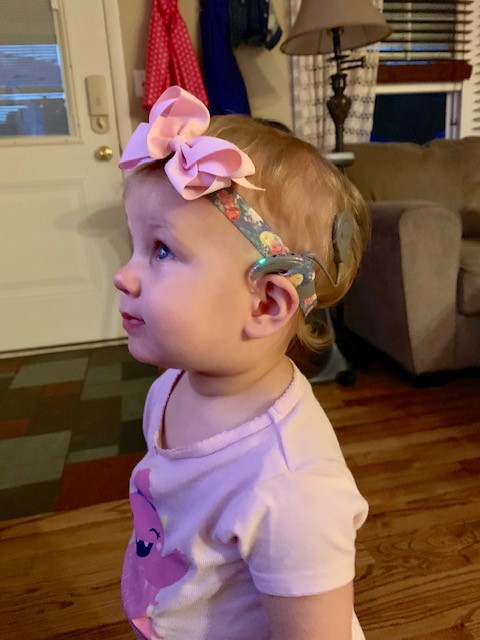 We knew nothing about hearing loss and it was then we learned that profound hearing loss meant she would not be able to develop spoken language. My heart sank to the pit of my stomach when the audiologist handed me pamphlets for American Sign Language (ASL), which left us devastated thinking that Carly may never be able to hear us say ‘I love you’ or be able to hear the sound of her name.
We knew nothing about hearing loss and it was then we learned that profound hearing loss meant she would not be able to develop spoken language. My heart sank to the pit of my stomach when the audiologist handed me pamphlets for American Sign Language (ASL), which left us devastated thinking that Carly may never be able to hear us say ‘I love you’ or be able to hear the sound of her name.
Carly’s pediatrician referred us to our local children’s hospital for a second ABR and the bad news continued with a profound hearing loss result again in both ears. We officially had her diagnosis – profound bilateral sensorineural hearing loss. I thought, ‘How could the first deaf person I meet be my own daughter?’
Her audiologist started giving us options, which included a cochlear implant or ASL. She told us that it would be a process to find out if Carly would be a candidate for a cochlear implant, but we knew we had to at least try to give her every opportunity to join the hearing world.
In the meantime, Carly received a set of hearing aids at just 3 months old, in hopes that she could hear SOME sound and keep her auditory nerve active. We also started receiving services through early intervention and met Carly’s teacher of the deaf. Her teacher was not only a supporter to Carly but also to our whole family. She began inviting us to community events so we could get a chance to meet other parents with deaf children, some with cochlear implants. Meeting other parents who had went through the same thing made us feel less alone in this journey.
Genetics testing for hearing loss
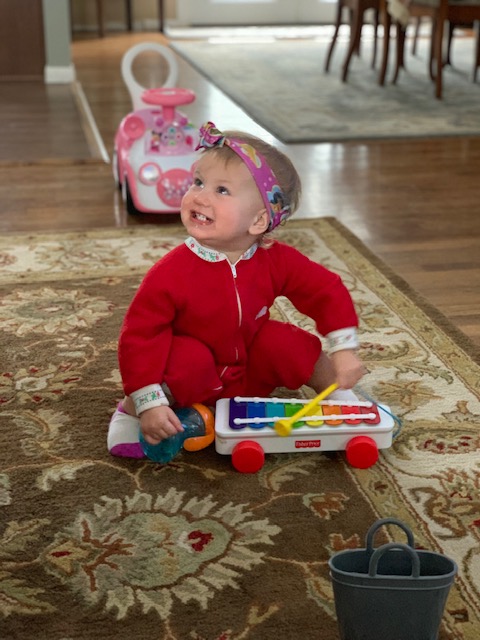 Genetics testing found that Carly’s hearing loss was due to the Connexin 26 gene mutation, and thankfully, hearing loss is her only concern. However, if we have more children, there is a 25 percent chance that they could also have a hearing loss, since we are recessive carriers for this gene. This came as a shock to us since we had no family members with a hearing loss.
Genetics testing found that Carly’s hearing loss was due to the Connexin 26 gene mutation, and thankfully, hearing loss is her only concern. However, if we have more children, there is a 25 percent chance that they could also have a hearing loss, since we are recessive carriers for this gene. This came as a shock to us since we had no family members with a hearing loss.
Carly’s surgery was on July 5, 2018 at our local children’s hospital. Recovery at home was not as bad as we thought it would be. Within two days, her swelling was gone and only three days after surgery, Carly took her first steps. Mike sent me the video of her walking for the first time with him saying, ‘Look at this little rock star taking her first steps after surgery!’
Carly’s implants were activated on July 25, 2018. Mike and I went in fully prepared not to get that ‘YouTube moment,’ but still ready to film it for memories. However, her reaction was absolutely amazing. When her implants were turned on, she immediately looked up at the audiologist then looked at me with the biggest and brightest eyes I have ever seen.
Activation joys and sibling love
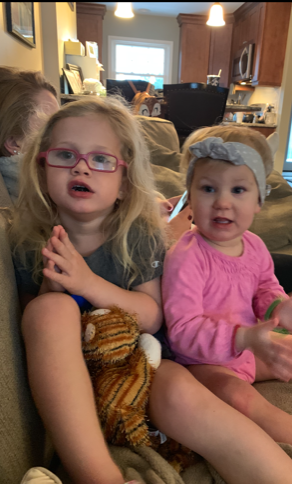 Since her activation, Carly loves to dance to music and loves to play with our Amazon Alexa12. When Alexa turns on, she laughs, claps and points with excitement. After Carly came home from her activation appointment, Allie yelled to us, ‘Carly can hear me now!’ I knew at that moment that this was the best decision Mike and I ever made.
Since her activation, Carly loves to dance to music and loves to play with our Amazon Alexa12. When Alexa turns on, she laughs, claps and points with excitement. After Carly came home from her activation appointment, Allie yelled to us, ‘Carly can hear me now!’ I knew at that moment that this was the best decision Mike and I ever made.
Allie and Carly’s relationship grew stronger once Carly was able to interact verbally. She responds to her name being called and now uses ‘baby babble.’ When her coil falls off, Allie always runs after her saying ‘Carly!! Let me fix your ears!!’ and Carly will stop and lean her head toward her.
Why we chose to go with Cochlear
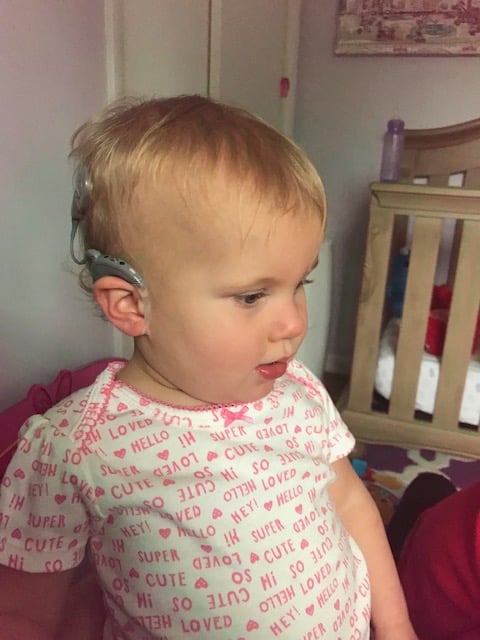 Cochlear was an easy choice for Carly. The success stories we found on social media of Cochlear recipients gave us the hope our family needed when we received Carly’s diagnosis during the hardest time in our lives. The Apple® iPhone34 capability5 was also a huge factor in our decision.
Cochlear was an easy choice for Carly. The success stories we found on social media of Cochlear recipients gave us the hope our family needed when we received Carly’s diagnosis during the hardest time in our lives. The Apple® iPhone34 capability5 was also a huge factor in our decision.
The Nucleus® Smart App6 makes it so convenient to monitor battery life on her sound processors and manage the level of sound wherever we are, as sometimes Carly has a hard time handling environments that have too much noise, such as large family gatherings and crowded events.
We chose the Nucleus 7 Sound Processors for her due to the Aqua+7 kit.
Our goals for Carly
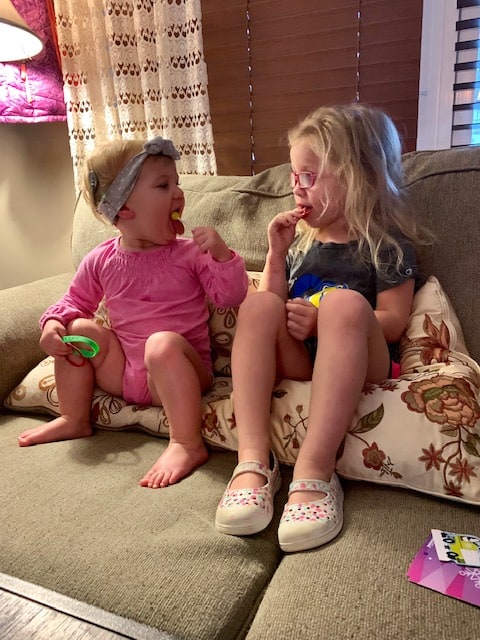 As of now, Carly is hearing at 25 decibels. She has started saying ‘Ma-Ma’ and loves to mimic monkey noises. Our goal is to have her in a mainstream school by kindergarten and to be hearing like her typical hearing peers by then.
As of now, Carly is hearing at 25 decibels. She has started saying ‘Ma-Ma’ and loves to mimic monkey noises. Our goal is to have her in a mainstream school by kindergarten and to be hearing like her typical hearing peers by then.
To any parent of a child facing the diagnosis of a hearing loss, I would tell them that the pain and fear that they are facing will be the fire that drives them to give their child any tool that will let them lead their best life possible. That tool for Carly was a Cochlear implant. We are so thankful every day that this technology was able to give Carly the gift of sound, which many people take for granted.
It is an understatement to say how grateful we are to Cochlear and our local children’s hospital for giving Carly the opportunity to live her life without any limitations. Truly, from the bottom of our hearts, thank you!”
Was your child born with a profound hearing loss? Are you looking for resources? Visit IWantYouToHear.com to get help and information.
- © 1996-2019, Amazon.com, Inc. or its affiliates
- Amazon, Alexa and all related logos are trademarks of Amazon.com, Inc. or its affiliates.
- ©2019. iPhone is a trademark of Apple Inc., registered in the U.S. and other countries.
- Apple, the Apple logo, FaceTime, Made for iPad logo, Made for iPhone logo, Made for iPod logo, iPhone, iPad Pro, iPad Air, iPad mini, iPad and iPod touch are trademarks of Apple Inc., registered in the U.S. and other countries. App Store is a service mark of Apple
- The Cochlear Nucleus 7 Sound Processor is compatible with iPhone, iPad and iPod touch. For compatibility information, visit www.cochlear.com/compatibility.
- The Cochlear Nucleus Smart App is available on App Store and Google Play. For compatibility information visit www.cochlear.com/compatibility
- *The Nucleus 7 Sound Processor with Aqua+ and Aqua+ Coil is water resistant to level IP68 of the International Standard IEC60529 when you use a Cochlear Standard Rechargeable Battery Module or Cochlear Compact Rechargeable Battery Module. Refer to the relevant User Guide for more information.